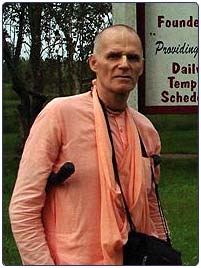Swami Holds Varnasrama Workshop at ISKCON New Talavana
By Sridevi Dasi | Sep 27, 2008

Bhakti Raghava Swami, a proponent of the simple-living, high-thinking lifestyle, visited the ISKCON New Talavana farm in Mississippi from September 12 – 14th to hold a weekend workshop.
The seminar conveyed the urgency of implementing Srila Prabhupada’s vision of varnashram dharma. Varnashram is a traditional vedic social structure of natural vocations and life stages. It is often confused with the birth-based caste system, which Vaishnavas consider to be a missaplication of the original ancient system.
Bhakti Raghava Swami has been guiding devotees around the world in developing varnashrama-based rural communities, and personally directs projects in Indonesia, Cambodia, Canada and India. His workshop aimed to rouse dormant US farm communities, and to encourage, enliven and enthuse devotees to take up the varnashram mission.
The Swami presented Gita Nagari Baru, an eco-village he oversees in Indonesia, as an example of a successful varnashram community. It consists of more than one hundred devotees, including teachers, skilled labourers, community leaders, farmers, students, and married couples.
Devotees attending his Mississippi workshop had many questions about the varnashram system, which categorizes society according to four vocations – brahmana (priest), ksatriya (leader), vaisya (merchant) and sudra (worker); and four stages of life – brahmachari (celibate student), grihasta (married householder), vanaprastha (), and sannyasa (renunciant). Some felt the system had controversial elements and wanted to know more.
One concerned devotee was afraid of being labeled a sudra, often wrongly considered to be low-class. The Swami replied that true varnashram, although dividing society into different natural categories, is classless. No one is inferior or superior because all are working towards the same goal: to please Krishna, or God. In the traditional Vedic society, he said, everyone has a God-given role, everyone is valued and everyone’s propensities are wisely used to please Krishna. He added that we must do away with the negative connotations of the word sudra.
Another devotee was concerned about how women would be treated when varnashram was implemented, saying that cultural norms for India could not be imitated artificially in the West. Bhakti Raghava explained that the Vedic scriptures cite six types of people who should be given special protection: women, children, brahmanas, cows, the elderly, and the diseased. This means that they should be respected and cared for, not exploited, as often happens when this instruction is misused. He added that the principles of varnashram dharma are not Indian, but a scientific universal standard that require proper training and education to fully appreciate.
Another devotee wondered where gays and lesbians would fit into a varnashram society. “We take the viewpoint that all spirit souls are meant to progress towards Godhead,” Bhakti Raghava replied. “No matter what one’s material situation, the most challenging and binding obstacle in this material world is the living entities’ perverted reflection of pure love, material sex desire, which all devotees have to work on.”
Bhakti Raghava Swami wrapped up the workshop by unveiling his upcoming three-month varnashram college course in South India. The course will run from January 1st to April 15th 2009, and candidates will be trained in all aspects of Vedic lifestyle. Topics include cow protection, agriculture, Ayurvedic medical care, pottery making, simple home building with local materials, basket weaving, cloth-making using ahimsa silk, bamboo crafts, and bullock cart transportation.
All in all, Bhakti Raghava’s presentation was well received by the New Talavana farm community. New resident Bhaktin Michelle, who is working on a research paper about simple-living and high-thinking for her Christian Church organization, commented: “Not only was it educational, but considering the current state of the US economy, it was also very timely.”















